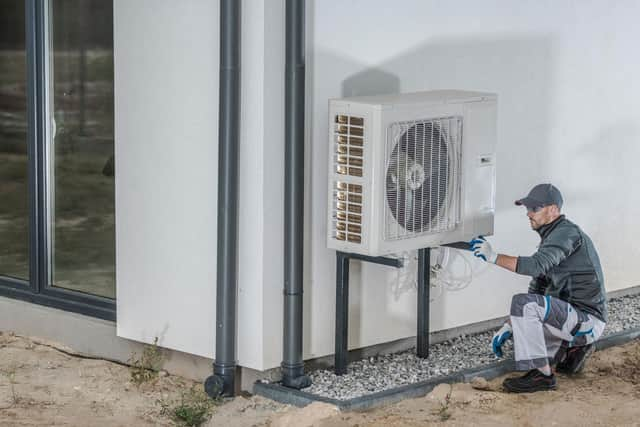What is a heat pump? How they work and how much they cost
and live on Freeview channel 276
The UK government has announced a £3.9 billion plan to reduce carbon emissions from heating homes and other building.
Part of this scheme is to offer homeowners in England and Wales a £5,000 subsidy for fitting a low carbon heat pump instead of an old gas boiler.
Advertisement
Hide AdAdvertisement
Hide AdThe hope is for no one to be buying gas boilers after 2035, opting instead for newer, more efficient ways of heating the home.


Here’s all you need to know about heat pumps, how they work, and how much they cost.
What is a heat pump?
Heat pumps take warmth from the air, ground, or water around them.
They are powered by electricity, rather than fossil fuels so do not produce carbon emissions themselves.
Advertisement
Hide AdAdvertisement
Hide AdIf you have access to a green or low-carbon source of electricity, then a heat pump is a more eco-friendly way of heating your home.
What’s more, a heat pump only uses electricity for power, rather than to actually generate heat.
This makes it a far more efficient use of energy. For comparison, a regular space heater produces one unit of heat per unit of electricity.
A space camp can produce more than three units of heat for every unit of electricity, making it three times more efficient.
How does a heat pump work?
Advertisement
Hide AdAdvertisement
Hide AdThe heat that is extracted from the surroundings is transferred to the refrigeration coolant inside the heat pump.
The coolant is then compressed, which increases the temperature significantly.
It then moves to the indoor unit of the heat pump, enabling it to raise the temperature of the entire home.
How much does a heat pump cost?
A heat pump can cost anywhere between £6,000 and £18,000, depending on the size and type you need.
Advertisement
Hide AdAdvertisement
Hide AdNaturally, larger homes will require larger heat pumps, and so on, meaning the cost will increase.
It’s not certain that heat pumps will be cheaper to run than gas boilers.
Although you would likely no longer need to pay a heating bill, your electricity bill may increase to compensate powering the extra appliance.
Is the heat pump grant available in Scotland?
However, the heat pump grant from the UK government could help many homeowners to pay for them.
Advertisement
Hide AdAdvertisement
Hide AdA subsidy of £5,000 will be offered to homeowners in England and Wales from next April.
There are also discussions to shift levies away from electricity bills over the next ten years to ensure that heat pumps are no more expensive to run than an ordinary gas boiler.
Unfortunately, the heat pump grant is not yet available in Scotland and has no plans to be introduced.
However, once it’s installed you can get paid for the energy you produce by joining the Renewable Heat Incentive scheme, which is open to those living in Scotland.
Advertisement
Hide AdAdvertisement
Hide AdWhat’s more, the Warmer Homes Scotland scheme can aid low-income and vulnerable households to get an air source pump grant.
The Home Energy Scotland loan can also help by offering an interest-free loan from the Scottish government to go towards the upfront cost of energy efficiency home improvements, including the installation of air and ground source heat pumps.
Comment Guidelines
National World encourages reader discussion on our stories. User feedback, insights and back-and-forth exchanges add a rich layer of context to reporting. Please review our Community Guidelines before commenting.
